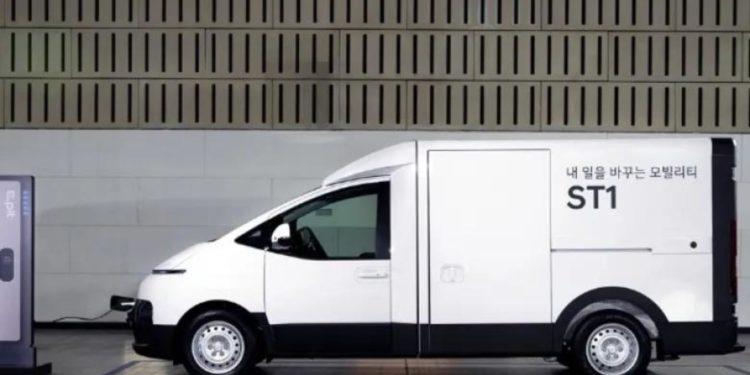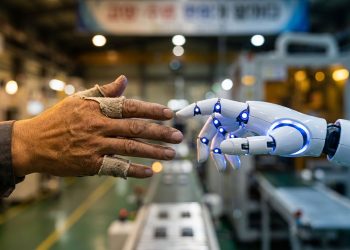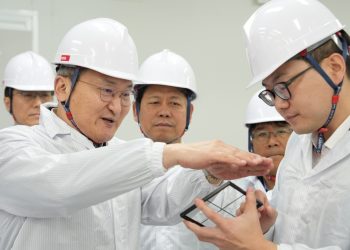Hyundai Motor Co., South Korea’s leading car manufacturer, announced the launch of its first fully electric work van, the ST1. Designed to accommodate various commercial needs, the ST1 lineup includes a standard cargo van, a refrigerated van, and a chassis cab, catering specifically to the logistical requirements of small businesses.
The ST1 is Hyundai’s entry into the electric commercial vehicle market, offering versatility and efficiency for businesses looking to adopt sustainable transportation solutions. With its adaptable design, the ST1 can be retrofitted for a range of purposes, including deliveries, emergency services, camping, and mobile farming.
Hyundai’s ST1, a software-defined vehicle (SDV), has versatility and is capable of being customized into specialized models such as police cars, emergency response vehicles, and mobile smart farms. Collaborating with major delivery firms like CJ Logistics Co. and Lotte Group, Hyundai ensured the ST1 meets the precise requirements of logistics operations, emphasizing features like enhanced cargo capacity and accessibility for underground parking facilities.
Released as part of Hyundai’s broader electric vehicle (EV) initiative, the ST1 represents the automaker’s commitment to extending its EV leadership beyond passenger cars to commercial vehicles. Drawing design inspiration from Hyundai’s acclaimed Staria minivan and KONA crossover, the ST1 showcases a futuristic front-end design, reflecting the company’s innovative approach to electric mobility solutions.
Hyundai’s ST1 is equipped with Plug & Play technology, enabling users to create separate connectors both inside and outside the vehicle, customizing power and communication data according to their operational requirements.
Employing the data open API for the first time, the ST1 facilitates real-time transmission of crucial vehicle data, including location, speed, battery charge level, and operational analytics, directly to customers’ computer systems. Enhancing user experience, the ST1 features an Android-based infotainment device, underscoring its versatility as a multifaceted business platform poised for future expansion into diverse applications.
Chung Yoo-suk, head of Hyundai’s domestic vehicle division, emphasized the ST1’s adaptability, stating, “Hyundai will commence its journey with logistics and delivery, yet the ST1 holds immense potential for diversification into tailored platforms for various purposes in the foreseeable future.”
Sporting a 76.1 kWh battery, both the ST1 Cargo and ST1 Cargo Refrigerated models deliver impressive performance, offering driving ranges of 317 km and 298 km, respectively, on a single charge. Notably, Hyundai’s ultra-fast charging system empowers the ST1, enabling rapid charging from 10% to 80% battery capacity in just 20 minutes, ensuring minimal downtime for commercial operations.
Hyundai ensures optimal safety and operational efficiency by incorporating logistics-centric features for user convenience. Smart safety protocols include dashboard alerts when the cargo compartment is open during movement. At the same time, the “Smart Drive Ready” system automates engine start-stop functions based on factors like seat occupancy and door status.
Hyundai developed the ST1 to enhance cargo handling efficiency by lowering the vehicle’s ride height and ensuring seamless loading and unloading operations. Designed with a focus on safety and practicality, the ST1 features a semi-hood design that extends forward from the cabin, providing additional space in the event of a collision. Black protectors have been strategically integrated into the front bumper, side skirts, and rear door trim to mitigate scratches, addressing common wear and tear issues encountered during daily operations.
Scheduled for release in the domestic market during the latter half of this year, the Hyundai ST1 plans for subsequent global expansion. Hyundai Motor CEO Chang Jae-hoon reiterated the company’s commitment to its Software-Defined Vehicle (SDV) initiative, emphasizing that this year would witness the full-scale implementation of the campaign. SDVs, colloquially termed “smartphones on wheels,” offer a revolutionary approach to vehicle functionality, facilitating seamless and continuous feature upgrades via wireless systems throughout the vehicle’s lifespan.
Echoing Hyundai’s endeavors, sister company Kia Corp. is gearing up to enter the commercial electric vehicle market with its line of customizable purpose-built vehicles (PBVs). Analysts anticipate intense competition in this space, with Hyundai and Kia vying against established players such as Ford, Rivian, GM, and Stellantis, all of whom are intensifying efforts to ramp up the production of commercial electric vehicles.
Also Read:
- KT Launches Responsible AI Center: Safeguarding the Future of Artificial Intelligence
- LG and Kakao Mobility Collaborate for Robot Last-Mile Delivery
- Collaborative Effort: South Korean Telecom Leaders Accelerate Rural 5G Deployment
- Hyundai Motor Group Partners with Toray Industries for Vehicle Material Innovation
- Seoul Hosts World IT Show 2024: A Showcase of AI Innovations







